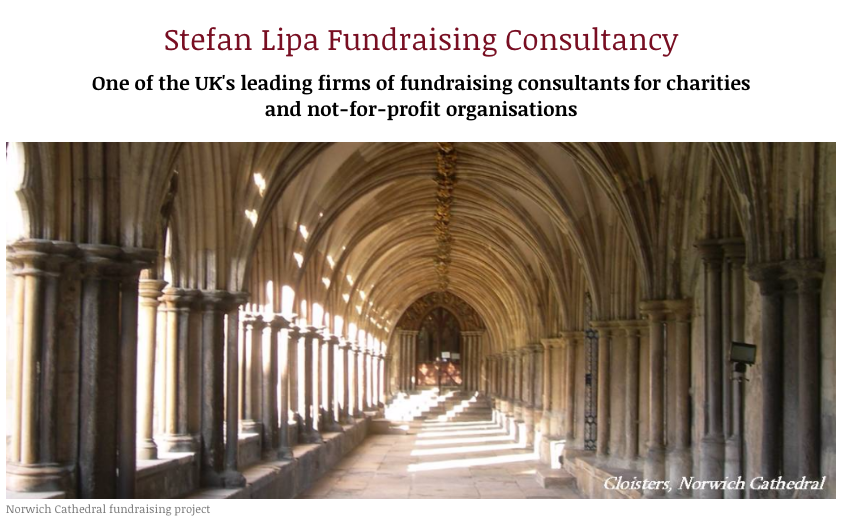Is fundraising consultancy a profession and how can charities make sure they receive a professional service? Five questions you should ask.

Stefan Lipa from Stefan Lipa Fundraising Consultancy – I’ve been a fundraising consultant for nearly 30 years and, during this time, I’m proud to say that I’ve helped many charities achieve their fundraising goals and thus enhance the support they offer their beneficiaries. However, according to a recent discussion paper by a fundraising think tank1, fundraising is not a ‘profession’– an assertion which of course I take issue with!
Fundraising consultants provide services, solutions and expert advice to the fundraising sector and I believe that there is a clear distinction between the need for professionalism and the formal professionalization of fundraising consultants.
As with any profession, there are fundraising consultants who are leaders in their field; who set the bar high by offering invaluable skills and experience – promoting best practice and making a tangible difference to charities, their beneficiaries and wider society. I believe that every fundraising consultant should take a genuine interest in the long-term success of their clients and that nobody should be in the profession if their main objective is to make a quick buck.
Maintaining high overall professional standards within the fundraising consultancy sector is ongoing but the large majority of us are effective and offer great value and support to our clients. It is vital that charities base their fundraising consultant recruitment decisions on clear evidence of a consultant’s knowledge, skills and experience rather than relying on letters after their name.
At present, fundraising is governed by requirements in the Charities Acts and the Fundraising Regulator sets and enforces professional standards and a code of practice. In addition, the Association of Fundraising Consultants (AFC) gives accreditation to the highest professional standards available in the EU for fundraising consultants. The AFC’s Code of Practice works in tandem with the Fundraising Regulator’s Code of Practice. Therefore choosing a fundraising consultant who is a member of AFC will provide confidence to the ‘buyer’ of a certain level of professional standards maintained by the fundraising consultant.
In previous opinion pieces, I have talked to some extent about the roles that fundraising consultants can fulfil and the results that we can help achieve [add links to website]. In this article I have summarised some of the questions you might wish to consider when choosing a fundraising consultant and to make sure they have the relevant skills and experience, as well as the professional approach we would all expect from a fundraising consultant.
- Does the fundraising consultant take a holistic view of your charity?
Make sure your consultant appreciates how charities operate. Check that they understand how the fundraising project fits into your charity’s overall strategy; how different departments or components within the charity operate; and that they have a genuine interest and understanding of your charity and beneficiary needs.
- Do their proposals provide a fresh perspective and are they realistic?
Ensure your consultant provides a clear, costed, proposal about the work they will undertake and that the proposal has been well-researched to ensure it will deliver on your brief.
Avoid consultants that work on a commission basis, which can be a disincentive to donors and it can lead to conflict and practices that are detrimental to the charity, donor and fundraising consultant. (Click here to read my article on The problem with commission-based fundraising) [add link]
Be careful of consultants that rush in and promise the world based on very little understanding of your charity’s circumstances and objectives. Make sure you are confident that your consultant will deliver; their proposals are researched and well articulated and the outcomes are realistic; they will put your charity’s interests first and use the best fundraising practices.
- Do they have the knowledge and experience you are looking for?
Look beyond a fundraising consultant’s qualifications, client list and achievements to understand if they have the right expertise to either complement or plug skill gaps in your charity. Do your due diligence – has the fundraising consultant delivered similar projects in the past? Does he/she have experience in the sector you work in or with charities of a similar size or with similar strategic goals?
Understand how they operate and go about achieving results and their budget and resource parameters. Ask for them to talk you through case studies and past achievements.
- How do they work and what is their approach to client work?
Make sure you share the same work ethic. Take references. Don’t just take the consultants word for it, speak to their current and past clients about how the consultant embeds themselves in client work/the client’s organisation.
Ask the consultant about their personal involvement in the sector – do they practice what they preach? For example, I consider fundraising consultancy to be part of who I am. In my spare time I’m a school governor for the Godolphin School in Salisbury (Wiltshire), I’ve previously been a Chair and Board member of the AFC, and I was the founder trustee and chair of the Friends of the Dean Garnier Garden at Winchester Cathedral.
- Are they prepared to give constructive advice?
Nobody likes to be told that their strategy is wrong or their plans won’t work. However, it’s important that you are not just told what you want to hear but that your consultant can demonstrate how he/she uses his/her expertise and knowledge to help coach and navigate your charity through change in order to achieve the desired results.
If you’re about to embark on a new fundraising challenge or need some additional support with your fundraising plans, why not get in touch to find out a bit more about how we can help you? Please click here to contact us.
Less than my job’s worth: Is fundraising a profession? And does it matter if it isn’t?, June 2017, Rogare













Recent Comments